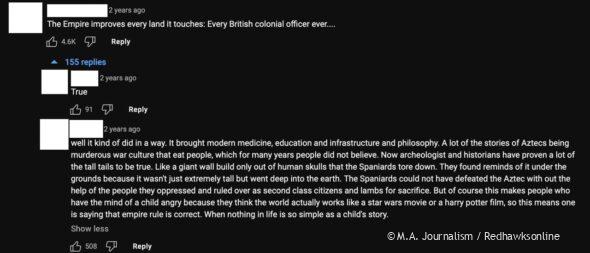A little while back, in the dark recess of what I call free time, I was exploring some online discussion of a fairly obscure show from the ’80s called Legends of the Galactic Heroes. The people online were praising a character in the show, Kaiser Rudolf, and saying that modern society needs a man like him to take charge.
In the show, Kaiser Rudolf was an eminent military general who took dictatorial power over a declining democracy and set himself up as monarch. He then proceeded to pass the “inferior genes exclusion act” which attempted to purge “lesser ancestry” from society as he simultaneously set up those he thought as ideals (the Aryan race) as his nobility.
In other words, Kaiser Rudolf was quite literally and quite purposefully space Hitler. These people were repeating borderline Nazi dogma.




Now, I don’t dislike the show much less for this occurrence. The show takes a point in showcasing different ideologies and discussing their merits and downsides.
And the ideology of Kaiser Rudolf is clearly rebutted in the events of the show. The reign he sets up ends in utter failure. But as I thought about, this happens a lot doesn’t it? Far too much to be perfectly comfortable.
Movies are powerful platforms for communicating profound and complex messages to wide audiences. Often this process involves portraying ideologies and philosophies the movie does not actually endorse. It’s an integral part of storytelling, there can’t be heroes without villains.
However, over years of being a denizen of the internet, I’ve accumulated an increasing frustration at a wide variety of groups endorsing the villain wholeheartedly. They’re not just discussing the nuances of the themes a movie presents and how the villain has some good points if ultimately wrong; they’re full-on adopting the malicious ideas that are supposed to be rejected.
 One of the main examples of this in my mind is the Joker from the Dark Knight. For those who haven’t seen it, the Joker, the main villain of the film, is an insane murdering clown, and his main motivation is to prove that any person can be driven insane from just one bad day. That the line between civility and immorality is artificial and thin. Also, the entire point of the movie is that he is wrong.
One of the main examples of this in my mind is the Joker from the Dark Knight. For those who haven’t seen it, the Joker, the main villain of the film, is an insane murdering clown, and his main motivation is to prove that any person can be driven insane from just one bad day. That the line between civility and immorality is artificial and thin. Also, the entire point of the movie is that he is wrong.
Despite persistent efforts from the Joker, the hero of the story maintains his oath against killing people. In addition, the climax of the film features the Joker rigging two boats, one a prison convoy and the other a civilian ferry, to explode if passengers of the other boat press a button. Despite the tense situation, neither of the boats explode the other to save themselves. Even in the few instances he succeeds, the Joker is still wrong because he was artificially pushing these people too insanity. It’s not the natural state of humanity.


The Joker has no uncomfortable but darkly true philosophy, he’s just a psycho that loves messing with people. However, a good portion of the internet will sing the Joker’s praises like he is the Messiah. People quote him like he’s some sage and not an insane lunatic. This is also not an anomaly. In another, The Wolf of Wall Street is a film based on the true life of Jordan Belfort, a Wall Street trader who scammed about 1,500 people out of a collective 200 million dollars. In other words, a bad person. The movie is a non-stop vulgar display of materialistic excess and patheticness, ending with Jordan Belfort in prison. The film also implies to be told by an unreliable narrator as shots will be inconsistent within the same scene. It is a complete satire of everything wrong with Wall Street.
In another, The Wolf of Wall Street is a film based on the true life of Jordan Belfort, a Wall Street trader who scammed about 1,500 people out of a collective 200 million dollars. In other words, a bad person. The movie is a non-stop vulgar display of materialistic excess and patheticness, ending with Jordan Belfort in prison. The film also implies to be told by an unreliable narrator as shots will be inconsistent within the same scene. It is a complete satire of everything wrong with Wall Street.
Despite the movie trying to be a message against leading a life of materialism and predatory behavior, many people interpreted the opposite. Almost any comment section under a clip of the film will have people repeating and praising the misled ideology of the protagonist.



I think a mistake that both these films commit is portraying these ideologies as too glamorous. Jordan Belfort may be leading a self-destructive lifestyle but it still looks so fun. I totally want to own a yacht and be able to party every day. The Joker may have deep psychological issues, but the acting performance from Heath Ledger is mesmerizing. He commands the movie in every scene and totally sticks it to those corrupt bureaucrats.
If something looks cool or romantic, it will be more appealing. It’s actually part of how the Nazis rallied people. They even had their uniforms done by a professional costume designer.
Behind Avengers
 But these are all examples of quite intelligent movies, generally good examples that may have had an unintentional negative impact. There is a far dumber example that draws my ire far more so. That is Avengers: Infinity War and Endgame.
But these are all examples of quite intelligent movies, generally good examples that may have had an unintentional negative impact. There is a far dumber example that draws my ire far more so. That is Avengers: Infinity War and Endgame.
I enjoyed both of these movies, they are quite fun and emotional. I do not believe enjoying them makes anyone lesser. But in both of these movies, the way the villain Thanos is portrayed is at best gross incompetence.
Thanos’s plan is simple: kill half of all life to prevent overpopulation. Beyond being morally dubious, this plan is overwhelmingly stupid. There are more than enough resources on earth to feed everyone, the issues occur with the breakdown of supply chains or flaws in society at large. The chaos from killing half the world’s population would only exacerbate these problems.
 Now, it’s fine for a villain to be stupid, the film calls Thanos the mad titan after all. The problem is that at no point in the film does anyone rebut Thanos on a level beyond hero catch slogans. If anything, both of these films race to prove Thanos right.
Now, it’s fine for a villain to be stupid, the film calls Thanos the mad titan after all. The problem is that at no point in the film does anyone rebut Thanos on a level beyond hero catch slogans. If anything, both of these films race to prove Thanos right.
Thanos’ home-world was apparently destroyed by overpopulation proving a need to act, in endgame Captain America mentions dolphins in the Hudson River, implying that nature is healing, and society after five years seems depressed but still functioning completely fine somehow.
The filmmakers almost seem to support Thanos, and as the Marvel universe goes on it only continues to appear that way. According to falcon and the winter soldier the world apparently came together and solved world peace during the aftermath of 4 billion people dying.
The film frames the snap as an utilitarian act that may be a moral atrocity due to the death, but does get some good results at the end of the day when that could not be further from the truth.
Even just 30 seconds of any of the supposed genius characters in either of these three hour films explaining how stupid this plan is would have gone a long way towards earning my forgiveness.
As a result of this film however there is real debate online about the veracity of a stupid plan. I would have preferred if the filmmakers kept his original motivation from the comics of wanting to please lady death instead of this idiocy that the filmmakers appear to believe is morally gray.
To some extent I might be too hard on these films. It’s possible even the most simple and blatant condemnations of an ideology will still be interpreted by some people as support.
In Star Wars, the (evil) Empire destroys a planet killing billions of people and state clear intention to continue doing so for no reason other than power. They were designed as a stand-in for the Nazis, something star wars material past the movies expands on. They are often criticized for being cartoonishly evil. A shot from the seventh movie of the franchise showing quite clear parallels with Nazis is even the cover image for this story.
Despite this, a healthy amount of the internet takes the position of “maybe they were right actually”.

A video from “The Film Theorists” YouTube channel. A channel that attempts to make educational content through theorizing about films.


It’s also possible the films haven’t actually changed anything. These people I encounter might have always harbored these feelings with the films just as an excuse to express them. Although, I guess that is also harmful. At the same time, for better or for worse movies can have a very real and very powerful influence over society.
In 1912, when professional racist, and president at the time, Woodrow Wilson played the KKK propaganda film Birth of a Nation at the White House it revived the KKK back from extinction after they had been crushed by President Grant 40 years earlier.
Transphobic portrayals in The Silence of the Lambs set back trans rights progress decades. “The Wolf of Wall Street” turned Jordan Belfort into a motivational speaker to the tune of 200,000 an event. The Bambi Effect, named after the 1942 animated film Bambi, is credited with helping to inspire the 1960 environmental movements.
While it’s not one to one, totalitarian states in the past and today use films as propaganda pieces.
I don’t think there should be no portrayal of negative ideologies in media. That would not only be an absurd demand, but as stated earlier, the portrayal of negative ideologies is ultimately necessary for the rebuttal and education against them.
However, when some movies arguably have verifiable body counts, and the world appears to only be getting progressively interconnected either the internet will have to get a whole lot smarter or movie makers will have to get a whole lot more careful. Preferably both.

